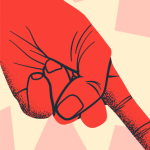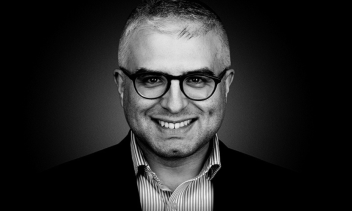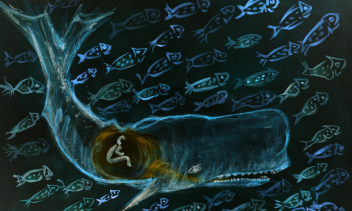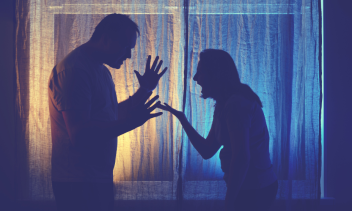Excerpted from Questioning the Answers, by Kayla Haber-Goldstein. Mosaica Press, August 2022. Reprinted with permission.
I’m finding it difficult to write this introduction. This book is not my personal memoir. However, it is important to understand where I am coming from.
Technically, the journey of this book began in 2016 when my son was born. However, in a deeper way, it began before that, as a young adult growing into myself.
I grew up in a religious home in Israel and went to schools deep in the chareidi system. My father is a well-respected rav and a very kind and wise man, someone whom I always strived to make proud. It is clear to me that this is why I never really rebelled — I didn’t want to cause him pain. So I more or less followed the status quo and didn’t get into too much trouble at school. Externally, at least, I kept up the life that was expected of me — by default.
I grew up, met my wonderful husband, and got married. We had a beautiful daughter and started our life together. I was very happy.
However, deep inside I had all types of questions — and doubts. I felt like the life I was living was…brainwashed. I had read a book about cults and vaguely felt like Judaism might be one. Deep down, some mitzvos bothered me, but I never did anything about it. I never even talked about it. Looking back, I think that I just didn’t care enough to stop being religious, or to connect to God. It was easier to just keep doing what I had always done and what those around me were doing. I just moved through life, and “keeping religion” was just another (relatively minor) thing I did to keep the beautiful life I had created.
Then, quite suddenly, my life fell apart.
My son’s birth was incredibly difficult and almost ended tragically. I spent the months after in bed, unable to walk for more than a few minutes. I was overwhelmed. I was sick, mentally and physically — and I was angry at how hard things were. It was at this point in my life that I finally started asking questions. I was angry and hurt and I felt betrayed by God. Privately, I stopped being religious by default; I wasn’t even thinking about it, I just could not be bothered anymore. I barely even wanted to live.
Life went on like this for about eight months. By this point, my husband was feeling a little lost. He supported me, wanted me to be okay, but he also wanted his children to be raised by someone who shared his value system. He needed a wife who would respect those values, and I wasn’t sure I wanted to do that.
Around this time, my husband’s rav was visiting the United States from Israel and kindly came for dinner. With my permission, my husband (Shmuel) told him the whole story and asked his advice. The rav looked at me calmly and asked me what my questions were. Here is where I hesitated. I knew what my questions were but, incredibly, I had never voiced them! Why? Fear of being yelled at or misunderstood, fear of disappointing or angering people, fear of hating myself…the list goes on. Whatever the reasons, the fact is that I had never, ever spoken them out loud. I refused then as well, and I responded that I could not tell him what my questions were, as he would never understand and would call me an atheist. I firmly believe God put the next words into his mouth. He calmly responded, “Well, you know all Jews have questions. The smart ones find answers.”
And so began the journey of this book. I started asking questions without any agenda as to what the answers would be. Hard questions.
Questions like:
- If God is so good, why do so many bad things happen?
- Why was I created?
- What about women’s equality?
I asked about the tiny details and the big things, like the creation of the world and the reason we keep Shabbos. I asked easy questions too, like why we cover our knees, etc., and I took notes of it all.
I started asking more and more questions, literally, all the time. Looking back, I’m proud of myself: I was asking sincerely. I wanted to understand why so many people were religious, and I was determined to find out their reasoning before dropping it all. Give it one more real chance, with the sole focus of finding answers.
Sadly, however, answers were not so forthcoming. In general, in the ultra-Orthodox community there is a culture that frowns on asking these kinds of questions. The number of times I was told that we should have “simple faith” and “just believe” became too many to count. When I asked questions at tables at which I was a guest, I was told that “this is why women should not learn Torah.” Even when I would go to classes to learn and I would ask questions, I was told, “It’s complicated,” or, “A good girl doesn’t talk that way.” It seemed like most places I went to just shut me down. I began prefacing my questions with “I am asking to know. I really want to know.” This helped somewhat, but I still wasn’t getting real answers. I wasn’t getting deep enough.
This experience was frustrating, to say the least. I was religious on the outside, empty on the inside — and had no one who could answer what I thought (really, what I knew) were legitimate and important questions. I couldn’t go on like this, and I needed a solution.
After a few weeks of gathering courage, I called my father with a request. I’m still not sure why it took me so long to ask him.
I had created a plan and I called him, determined. I told him what I had been going through. And then I asked him why, if the Torah was really given to men, women, and children, it was so hard for me to get anyone to teach me about it.
I expressed how I felt as though Judaism were not really mine, that I was merely a servant in it. I let him know that I was on a mission to find answers. I asked if he would help me.
My father readily agreed. So, with my husband there for the day-to-day and my father there to give direction and answer the hard questions, they helped me learn, helped me learn how to learn, and helped me understand.
Incredibly, at the time I thought I was alone. I thought I was the only religious girl who was confused. Once I began asking questions more openly, I started sharing with my friends, and found many of them had questions as well. I opened an Instagram account and discovered even more young women like me with questions and doubts. Conversations developed and I realized I was far from alone in this. So many young women, teenagers, and even older women have questions like me — and rarely find answers. Most don’t even know how to formulate the questions. I became even more determined to answer the questions and write this book, to give women a safe space to explore, without anyone second-guessing their reason for asking. It is our Torah, and it should feel that way, for each and every Jewish man and woman.
The more I discovered, the more I was blown away by the answers. Things I never knew, things I was told to just believe in, were suddenly coming alive. I was on fire! I wanted to know more. Everything was making sense. My heritage was rich, amazing, and wonderful!
But suddenly I stopped in my tracks. I asked myself: Why did I have to wait more than twenty-five years to get these answers? If someone would have told me this when I was thirteen or twenty-one, it would have saved me so much stress and confusion. Yes, I could have asked, but I didn’t know how to. I wanted to know why it was not taught this way to begin with. Why do some people never get these answers?
I now understand much better the reasons for so many seemingly arbitrary rules. I’m still learning — aren’t we all, hopefully? — but I realized that once I was really open to listening, I was incredibly fortunate to have a father and a husband who were both qualified and willing to guide me and let me learn at my pace. The fact that my husband was okay with me exploring and doing things on my terms, in my way, was incredible. Not everyone is so fortunate. I wanted to give the opportunity that I had to women everywhere. To teach them why we do the things we do and to help give meaning to their lives. To explain the thought process, the sources, and the ideas behind our beliefs. This is our heritage! I knew it was unique that I had the space to ask these questions and come back on my own terms.
It is hard for young women to ask questions without risking everything, especially once they are wives and mothers. I owe a huge debt of gratitude to my husband for giving me that space and respecting me through it. I am eternally grateful to my father for never once judging me harshly.
Not everyone can ask and explore freely.
Therefore, this book.
Now a disclaimer: Before you begin reading this book, I would like to point one thing out. There is a commandment in the Torah that a judge is not allowed to accept a bribe. He is not even allowed to accept a no-strings-attached gift from any of the parties in question. This is because it blinds him to the truth. No matter how objective the judge tries to be, he can no longer be one hundred percent unbiased.
When it comes to understanding this book and any other book like it, the same applies. If you are focused on your desire to live free of rules and do whatever you want, then you will not be able to see the truth. This book won’t answer your questions because, right now, you aren’t really asking questions. I feel for you, but this book is not really for you.
But if you are looking for the truth and really want to know what to believe in and how to live your life, this book is for you. As I mentioned above, I asked these questions with no hidden agenda. I wanted to know the truth, whether it was real or all a lie.
We ask questions to find answers, not to find excuses.
By virtue of you still reading this book after that disclaimer, I am happy that you are here to learn. I am grateful that you are looking for the reasons, meaning, and truth behind the rules.
Thank you for sharing in my thirst for knowledge and my curiosity about our heritage. Thank you for taking the time to read this book. This is a long, unbroken line passed down generation to generation, starting with God. This is my heritage. This is my tradition. And it’s yours, too.
It is your inheritance. No matter what you have done or not done, no matter who you are or what you have been told, Torah belongs to you as much as it does to me or anyone else. Your relationship with God is unconditional. Take advantage of it. Own it. If you do not understand it, ask about it.
It is yours.
If you have any questions, I can be found on Instagram @questioningtheanswers or kaylahaber@gmail.com.








